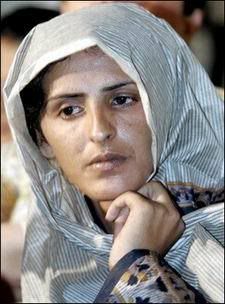 Mukhtaran Mai is a name familiar to most Pakistanis. In 2002, she was raped by 4 men from a rival tribe as per the decision of local elders in a tribal jirga. The story of the jirga decision is a fascinating tale itself in how our judicial and extra-judicial systems sometimes work in rural Pakistan.
Mukhtaran Mai is a name familiar to most Pakistanis. In 2002, she was raped by 4 men from a rival tribe as per the decision of local elders in a tribal jirga. The story of the jirga decision is a fascinating tale itself in how our judicial and extra-judicial systems sometimes work in rural Pakistan.
While many women quietly suffer an ill fate at the hands of such tribal decisions, and sometimes committ suicide from the ‘shame’, Mukhtaran Mai fought back. Her prepetrators of the crime were tried in the anti-terrorism courts and death sentences were handed down to the guilty. Since then, the judicial process has taken the case back and forth and most recently the Supreme Court has decided in her favor.
Mukhtaran Mai has become a symbol of resistance and hope for women in Pakistan, and all over the muslim world. In addition to fighting the case in courts, she has become a movement for bringing education to her village, and attention to the broader issue of women’s rights in Pakistan. She buillt the first two schools in her local village of Meerwala, in Southern Punjab and now campaigns internationally.
But now one can read a weekly blog by Mukhataran Mai, her own own internet diary about her life, her village, and the work she is doing internationally to promote women’s causes. Her blog is in urdu and is hosted by the BBC Urdu service. Since Mukhataran cannot read or write, she tells her stories to a local BBC journalist, who types it up as a web diary.
About her blog, she says:
“Mostly I talk about incidents which are cruel and painful. I try to discuss only the most serious things in my blog: the poor treatment of women, sometimes leading to killing,” she says.
“I sometimes talk about my childhood memories – events that take place at my schools; or perhaps just about the household chores.”
“I don’t think that the people in our village know what it’s all about and what I am writing. But I’ve received a few e-mails from other places – people who have reading my blog on line and who encourage me to continue.”
Mukhataran Mai’s presence on the web, in the form of a blog, is a wonderful reminder of how digital access can open doors for a better communication between people lwho otherwise may never meet each other. Mukhataran’s audience is global, and while most support her cause, not all people agree with the path she has chosen; some may not even sympathize with her. But at least a healthy discussion is happening where a village woman can be a party to share her thoughts and opinions. Even about the naysayers, she says:
“It’s their kindness that they read the material. I am grateful to them. They encourage me to continue in my work in the village, and for women everywhere in Pakistan.”




















































For our moderation policy, please refer to our comments policy, including refrain against unsubstantiated character assasination, personal attacks, rumor-mongering and slander.
Bilal
You say:
“Since then, the judicial process has taken the case (accusation of rape by MM) back and forth and most recently the Supreme Court has decided in her favor”.
Mastqalandar however says:
“To her
Hi, hello, privet
toyota truckl g
you are great women,we all pakistani appriciate,you are working for women health and save the women in pakistan.
please if your any office in lahore mail me i would like help your ngo, i have some experience i hope you advantage with my work.
thanks mail me
Mukhtanra Mai’s horrible ordeal has no words, all I can say, just in punjabi (if she is able to hear me):
Begum Sahibah, pakistani tay ki, sari dunya des mard, putar,
dhian,bachay, ma piu,tay saray farishtay tuhano salaam paye
kenday nay, tuhadi azmat tuhadi izaat tar tar kar kay wi buland hi raway gi, tuhadha hosela kamal da hey, aprhin sari
koshish jari rakhna, ayna siasi gundain de hissab sab day samaney away ga. ALLAH swt di lathi beawaz hey, assy sarey
tuhaday tay tuhadi jei hazaran bibian dey qrazdar hegay an, Asan tuhaday lie kugh na kar sakey, Inallilahi wainah elaihey rajeoon.